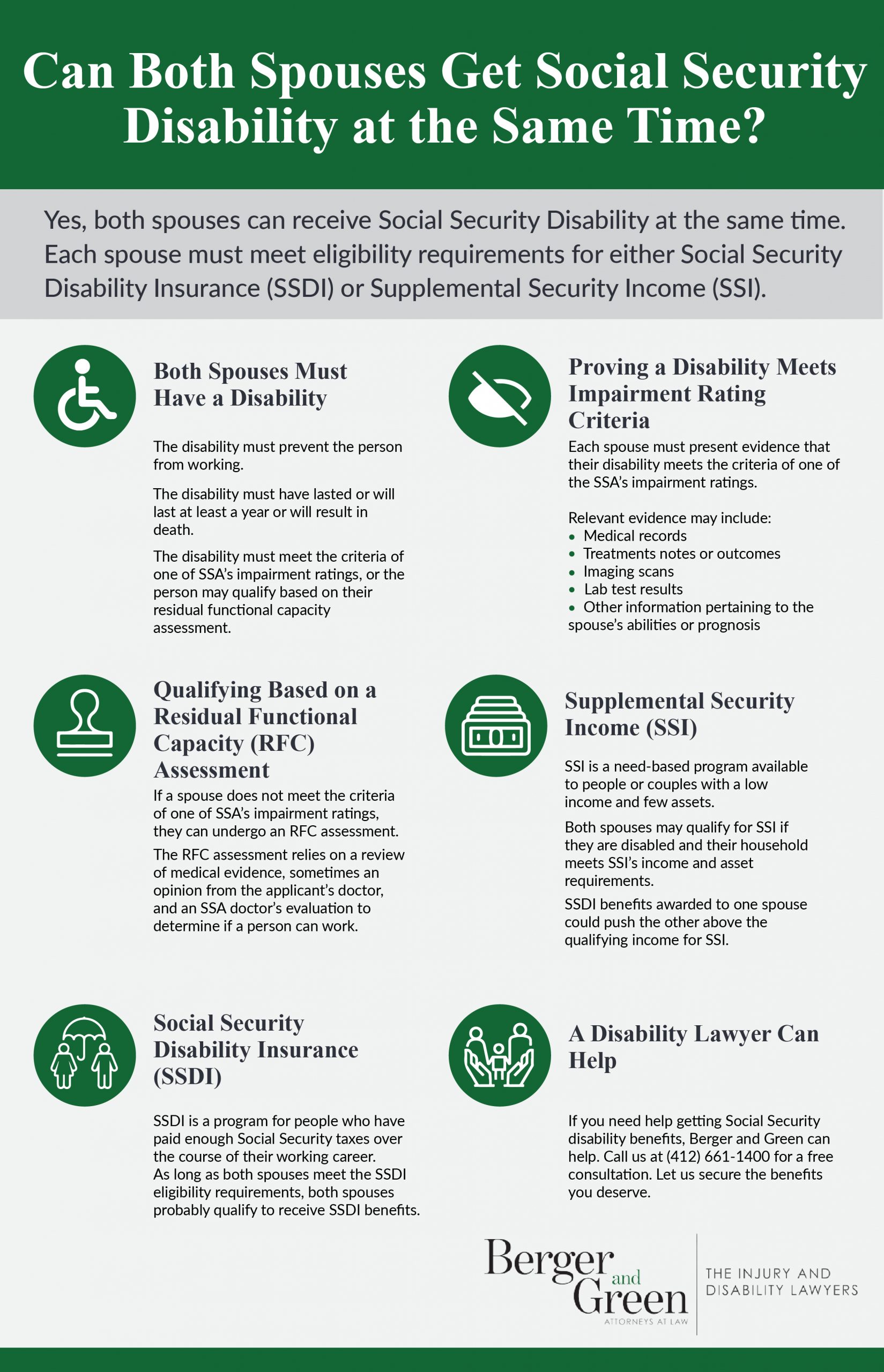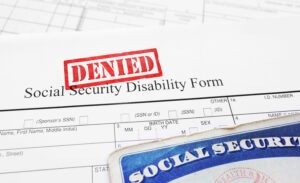
In general, both spouses can get Social Security Disability benefits at the same time. However, because the two disability benefits programs have their own qualifications, it may be easier under one program than the other.
It is possible for married couples to both draw Social Security Disability Insurance (SSDI) benefits or Supplemental Security Income (SSI) benefits, providing they otherwise meet each program’s requirements. A Pittsburgh Social Security Disability lawyer can help you both apply for disability benefits, and in the case you receive a denial, they can also help you appeal the denial.

How Can Both Spouses Get Disability Benefits at the Same Time?
The only way you and your spouse can both draw disability at the same time is if you both qualify under the Social Security Administration’s (SSA) rules. You both must have a disability that prevents you from working, is likely to last at least a year, or will lead to your death.
You and your spouse must submit medical documentation that satisfies the SSA’s specified criteria for impairments. If you cannot work due to a disability, you may qualify for benefits. Either your doctor or a Disability Determination Services representative from the SSA will review your medical history to determine if your condition prevents you from working and qualifies you for benefits.
Both you and your spouse will need to discuss your condition with your doctor. It is important that you inform your doctor about how your disability affects your daily life. Your doctor plays a key role in documenting your impairment, which is essential to applying for disability benefits and winning your claim. Sometimes, vital evidence can get lost in the go-between, which may have caused your denial of benefits.
40+ years of experience from strong, knowledgeable, compassionate attorneys.
Start A Free EvaluationHow Can My Spouse and I Meet the Eligibility Requirements for SSDI?
As long as you both can prove you suffer an impairment that prevents you from working and you meet the work credit requirements for SSDI, you can both receive benefits. The SSA reviews your qualifying criteria on their own merits. Your spouse’s impairment, financial resources, or other factors do not affect your application.
Because of the nature of the program, the SSA requires you to work long enough to earn a minimum of 20 work credits. This value can change based on your age. Both you and your spouse will need to have sufficient individual work histories to qualify for SSDI benefits.
If you or your spouse are still doing some work, it must be under the substantial gainful activity (SGA) limit. If neither of you can work—or you work in only an extremely limited capacity—you should meet this requirement. Since your SGA does not include passive income, income not earned through working, you may qualify for disability even if you have additional household income from investments, retirement, or other sources.
We know you’re hurting. We can help. Free case evaluations, home and hospital visits.
Contact Us Now For HelpWhat if We Do Not Qualify for SSDI?
You and your spouse may qualify for SSI benefits even if you live together. You must both meet the disability and limited income requirements, though.
SSI does not only consider your individual income; it takes other forms of household income into account, including your spouse’s SSDI or SSI benefits. If both you and your spouse have SSI benefits, both of you may see a reduction of benefits if you live in the same household. You may no longer qualify for SSI benefits if your spouse gets SSDI and your household exceeds the SSI income limit.
If your spouse qualifies for SSDI but you lack the necessary work history—but you meet the other program qualifications—it may be possible to get approval for SSI if you meet the income and resources guidelines. Our Social Security Disability attorneys can determine if you qualify in this situation.
You need an attorney with the experience and dedication to give your case the care it deserves.
Start A Free EvaluationWhat Our Social Security Disability Lawyers Can Do to Help
The disability lawyers at Berger and Green can help you determine if you and your spouse both qualify for benefits. We will take a detailed look at your medical records, work history, and financial information to check if your family qualifies for monthly benefits from SSI or SSDI. Our role as a Social Security disability lawyer extends beyond initial assessments to encompass a range of supportive tasks:
- Detailed eligibility assessment: Our lawyers evaluate both your and your spouse’s disability claims to determine if you meet the medical criteria and work credit requirements specified by the SSA.
- Document preparation and submission: We prepare and organize all necessary documentation, ensuring that applications are complete, accurate, and submitted on time.
- Gather medical evidence: Our attorneys gather evidence from your healthcare providers to document the extent of your disabilities.
- Strategic advice: We provide strategic advice on how to best present your case to the SSA, including guiding you on the implications of continuing to work while applying for benefits.
- Regular updates and follow-ups: Throughout the process, we keep you informed about the status of your application and any additional information or actions that may be required.
By handling these crucial steps, the Social Security disability lawyers at Berger and Green help you receive the benefits you need, ensuring that every aspect of your application is thoroughly and professionally managed.
If you received a denial of benefits from either program, our Social Security Disability lawyers can also manage your case through the appeals process. Depending on your circumstances, you may have to request a reconsideration or a hearing before an Administrative Law Judge. Our lawyers can guide you through the appeals process step by step.
We Can Request a Reconsideration of Your Claim
The first step in appealing a denial of SSA disability benefits is to request a reconsideration from the department that originally handled your claim. A simple error on a form may have prompted a denial, and reconsideration may address this issue.
We Can Request a Hearing With an Administrative Law Judge
If the SSA upholds its original denial of benefits, we can continue fighting for you by requesting a hearing with an Administrative Law Judge (ALJ). You may be able to attend a hearing in person or via telephone and we will prepare you beforehand.
We Can Request a Review by the SSA Appeals Council
If the ALJ agrees with the original decision, we can request a review of your denial by the Appeals Council. This department will either send your appeal back to the ALJ or decide your case itself.
We Can Request a Review With the Federal Court
If you still face a denial of benefits, we can ask for a review with the Federal Court. Our disability lawyers are not afraid to do what it takes to fight for your benefits.
Contact one of our area Social Security Disability lawyers today to learn more:
- Pittsburgh Social Security Disability Lawyer
- Erie Social Security Disability Lawyer
- Altoona Social Security Disability Lawyer
- Johnstown Social Security Disability Lawyer
- West Mifflin Social Security Disability Lawyer
- Plum Social Security Disability Lawyer
- New Castle Social Security Disability Lawyer
- Baldwin Social Security Disability Lawyer
- Allison Park Social Security Disability Lawyer
- Wilkinsburg Social Security Disability Lawyer
- Upper St. Clair Social Security Disability Lawyer
- Columbus Social Security Disability Lawyer
We can address all the legal hurdles that may be keeping you from getting a fair settlement.
Speak To An Attorney TodaySee What Our Social Security Disability Lawyers Can Do for You
If your spouse already receives disability benefits and you believe you may also qualify, the legal team from Berger and Green can help. We can explain how your approval could affect your family’s current benefits and manage your case through the application process.
If the SSA denied your benefits, we can examine why and fight for the monthly payments and back benefits you may deserve. Call us at (412) 219-5084 for a free consultation and learn about how our disability lawyers can help you and your family.









